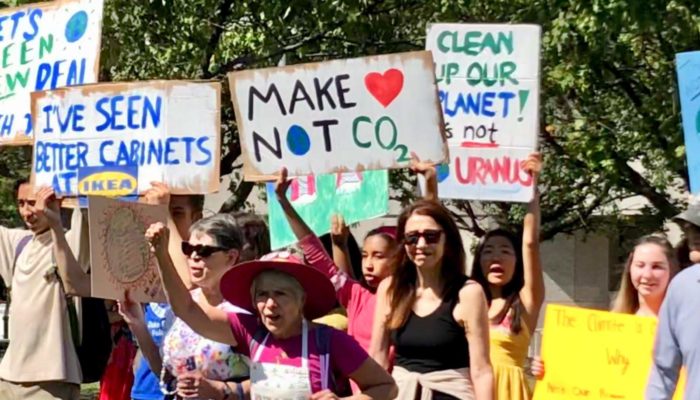
In a powerful sign of solidarity, adults from across an estimated 185 countries took to the streets to join last Friday’s youth-led Global Climate Strike, the largest climate protest in history. Among those in attendance were hydrologists from around the world, who stood shoulder to shoulder with young people to support their calls for immediate climate action.
As a hydrologist who participated in the Global Climate Strike, I was interested in exploring my colleagues’ motivations for attending in hopes of learning more about how I — along with the broader scientific community — can continue to support youth-led efforts for climate justice. So I reached out to hydrologists from across the globe and at different career stages. This is what they had to say. All statements presented reflect the views of the individual contributors.
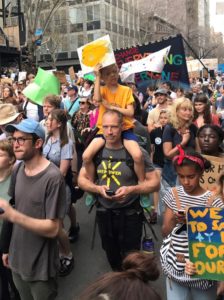
James Bennett is a Senior Research Scientist at CSIRO, Australia.
James Bennett (Melbourne, Australia): “I support the climate strike for my kids. I mean this both in the immediate sense – both my children wanted to go to the strike, and they are too young to go unsupervised – and also in the broader sense, in that their generation and beyond will wear the worst consequences of inaction. Children are clear-eyed about it: they are outraged by the damage we are doing to our natural world and the risks we are taking with the health and happiness of millions of people. And of course they are right.
I also think scientists can provide important support to activists, even if our research isn’t directly addressing climate science (my research doesn’t). We know how hard it is get our work through peer review. And if you work in the earth sciences, chances are you personally know colleagues researching climate, and you know that they are highly trained and dedicated. So our confidence in climate science doesn’t draw only from theory or reading papers, but also from knowing first-hand how rigorous it is. Nothing shows our confidence in the science better than standing shoulder to shoulder with activists. I think it’s our moral obligation to support them.”
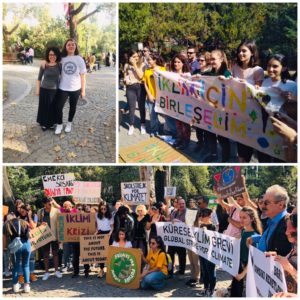
Upper right: (Credit: @fff_ankara), Bottom: (Credit: @fff_ankara), Upper left: Nilay, a hydrologist from Middle East Technical University, Turkey, with Buse, a 16-yrs old climate activist.
Nilay Dogulu (Ankara, Turkey): “Planet Earth is wonderful with its ALL habitants regardless of any differences. It is time to raise the consciousness of humans to bring back equity for all, starting with Nature. Earth needs to recover from a sickness (#ClimateCrisis), and each and every cell of Earth (#You, yes you!) must act together to its highest will and strength possible to help this massive cleaning & healing.
Buse is only 16 years old, half of my age (Oddly enough I look very young next to her). She has a very strong sense of courage and perseverance for uniting against climate crisis.
As a women in science, I value the power of youth striking against climate crisis. What’s happening today all around the world is just the beginning. We are moving towards a golden age and it is being led by youth. Now is the time to blend in!”
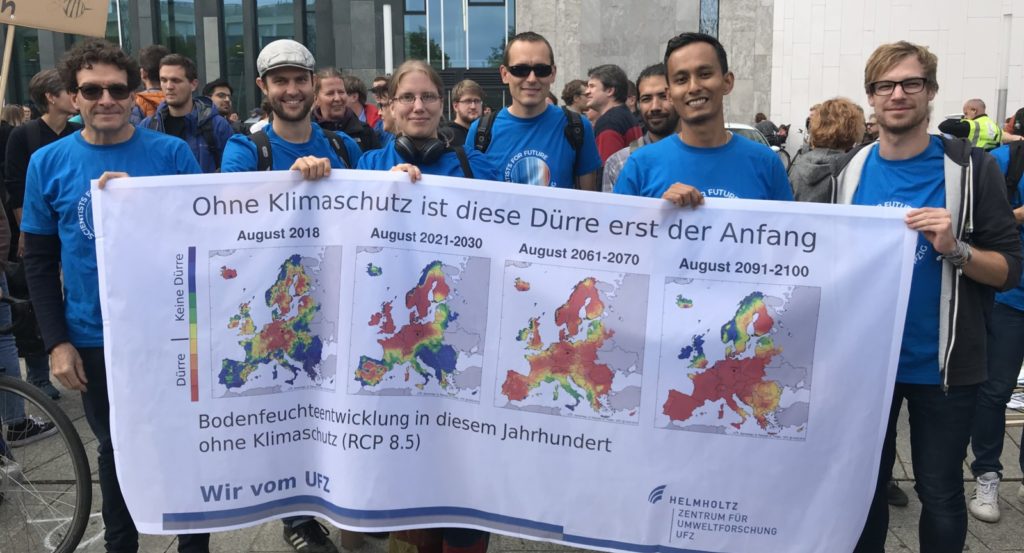
Dr. Luis Samaniego, Deputy Head of Department of Computational Hydrosystems Helmholtz-Zentrum for Environmental Research – UFZ with colleagues on the Climate Strike in Leipzig, Germany.
Luis Samaniego (Leipzig, Germany): “Available hydro-metereological observations show that the Earth climate is changing fast and may reach a point-of-no-return in the coming decades. Recent research shows that “extreme temperature records will be set in approximately 58% of the world every year” (Power & Delage, 2019). These dramatic changes will have negative consequences for the ecosystems and will be decisive for the fate of humanity in this planet, the only one we have. In Europe, for example, state-of-the-art climate and hydrological projections show that the mean area under extrem heatwaves will increase from 5% under a +1.5 C world (w.r.t. preindustrial times) to 18% under a +3 C world. Similarly, drought area will increase by 40% (± 24%) and will affect 42% (± 22%) more people (Samaniego et. al., 2018). Dry periods will become hotter! According to the IPCC, the chance to stay below the +1.5 C world is around 50%. This means that we don’t have much time left to take actions…For these reasons, I urge every concerned citizen to do as much as possible to reduce of their CO2 footprint now. Similarly, I demand our elected officials to take immediately actions leading to come to an end the age of fossil fuels. As as scientist, I also urge my colleagues to raise their voices and help to illustrate those fellow citizens that are not aware of these hard scientific facts or that have been misled by ignorant politicians.”
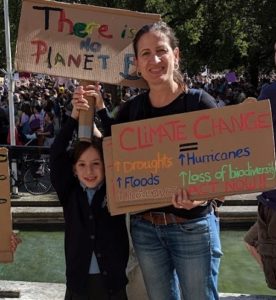
Dr. Katerina Michaelides, Senior Lecturer at the School of Geographical Sciences, University of Bristol, UK.
Katerina Michaelides (Bristol, UK): “I think we owe it to today’s youth to support them in their fight for reducing greenhouse gas emissions and slowing down the rate of climate change. I work on the impacts of climate change on the water security in East Africa. From our research, it is clear to me that this region is suffering more frequent and more intense droughts as a result of climate change over the last three decades. The implications for millions of people are immense – loss of livelihoods, mass human migration, loss of biodiversity, water scarcity and food insecurity, disease, conflict… I don’t want climate change concerns and impacts to dominate the future of my daughter’s generation.”

Prof. Werner Aeschbach from the Inst. of Environmental Physics, University of Heidelberg, Germany.
Werner Aeschbach (Heidelberg, Germany): “I support the climate strike movement because the young protesters explicitly refer to climate science. As environmental scientist aware of the severity of the climate crisis I feel obliged to confirm that the protesters’ concerns are justified, thus I signed the corresponding statement issued by the “Scientists for Future” (Hagedorn et al., 2019, GAIA 28: 79-87). The climate strikers need our backing and we scientists need their societal impact if we want that our warnings about climate change, biodiversity loss, or water crises are heard by the public and by political leaders.”
Kelly Hondula (Annapolis, USA): “I support the climate strike because I’m inspired by the organizers and want to amplify their voices, passion, and vision. Research in journal articles can only go so far towards informing public consciousness and policy decisions that affect our planet. Aside from calling for action from governments and corporations on climate policy, participating motivates an urgency for me to conduct rigorous science that is relevant for figuring out how to create a just and livable future — especially for the generations that are still counting down the days until they can vote.”

Kelly Hondula, a PhD Student in Water Resources at the National Socio-Environmental Synthesis Center, University of Maryland, USA.
Ryan Emanuel (Raleigh, USA): “Young people need to know they are acting not only with the support of scientific consensus, but also with the support of actual scientists. As their teachers, parents, elders, and mentors, we should stand alongside youth who speak out for the future they want instead of the future they see being prepared for them. With that in mind, I fully support the youth climate strike and other actions that bring attention to the climate crisis.”
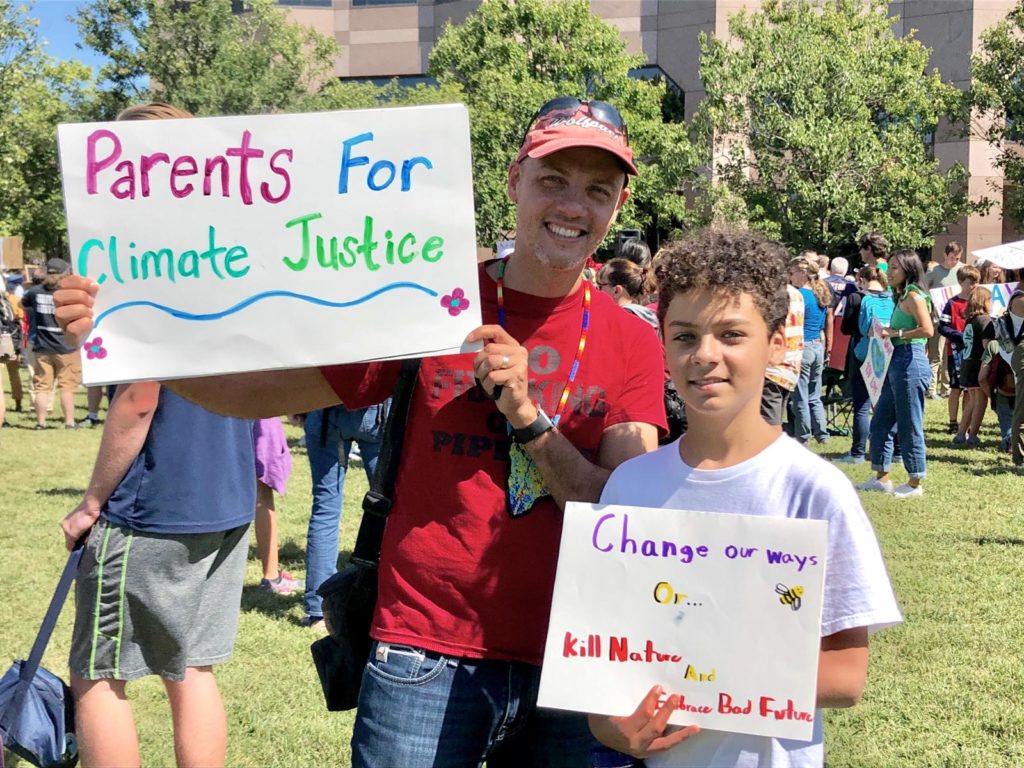
Prof. Ryan Emanuel from the Department of Forestry and Environmental Resources, North Carolina State University, Raleigh, USA.
Guillaume Thirel (Paris, France): “As a scientist working on climate change, and a human being sensitive to environmental issues, I felt that joining the climate strike was compulsory. We have to help and support this youth that seems to be our best option to evolve towards a sustainable future.”
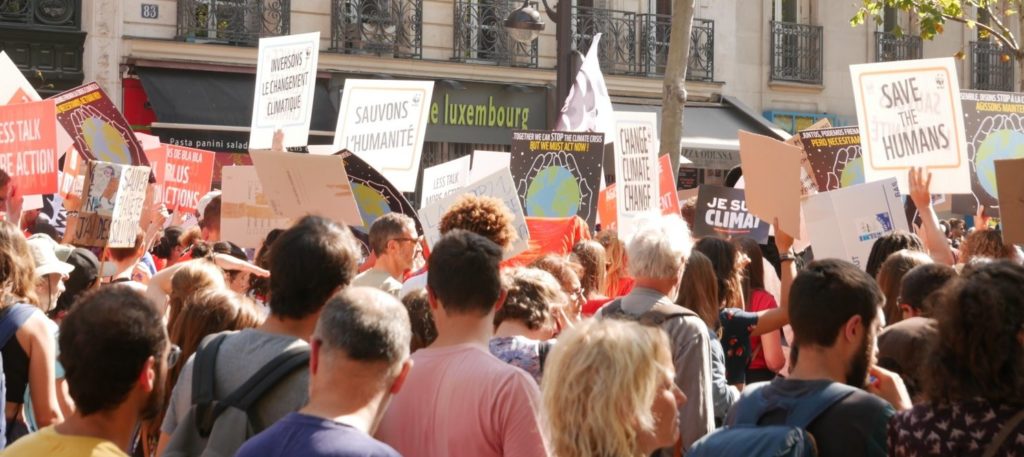
Protesters on the climate strike in Paris, that Guillaume Thirel, a researcher at Irstea, France, attended.

Hannes Müller-Thomy, postdoc at the Institute of Hydraulic Engineering and Water Resources Management, TU Vienna, Austria.
Hannes Müller-Thomy (Vienna, Austria): “I strongly support these kind of demonstrations to raise the awareness for the biggest challenge in humankind. Only if we all face it together, we will have a chance to deal with it. The demonstrations are a perfect starting point to show this union spirit.”

Dr. Gökçen Uysal, Asst. Prof. at the Department of Civil Engineering, Eskisehir Technical University, Turkey.
Gökçen Uysal (Eskisehir, Turkey): “We are uncontrollably changing the climate and disturbing the natural life in this wonderful Earth. This is happening right now and in every moment, it is real! One of the biggest exam of humankind of this era is that whether we will be still ignoring the damage we have done or not. More terrifying is, most of the people are not yet aware of this destruction or they are pretending as if it does not exist. We do not have too much time to take an action. This global climate strike brings awareness for us, for all, for every life in the world, and I believe we as scientists should be shouldering responsibility more than anyone else.”
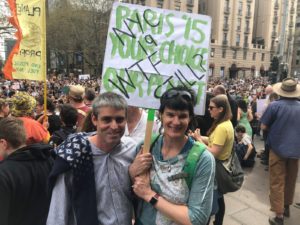
Prof. Michael Stewardson, Department of Infrastructure Engineering | Melbourne School of Engineering, Discipline leader Environmental Hydrology and Water Resources
Michael Stewardson (Melbourn, Australia): “I’m supporting the Climate Strike because I am worried about the future. It is apparent that good science and evidence-based communication is not enough to drive the necessary transformations.”
Sina Khatami (Melbourn, Australia) (no photo): “I support climate strike because climate change is an existential threat to our species, one that has never arisen in human history. If we want organized human life to survive in any decent form, we need to pressure politicians and other decision makers to take meaningful actions NOW.”
Unfortunately, I have not yet received contributions from South America and Africa.

Pingback: GeoLog | Looking back at the EGU blogs in 2019: a competition - GeoLog
Pingback: GeoLog | Winners of the EGU Best Blog Posts of 2019 Competition - GeoLog